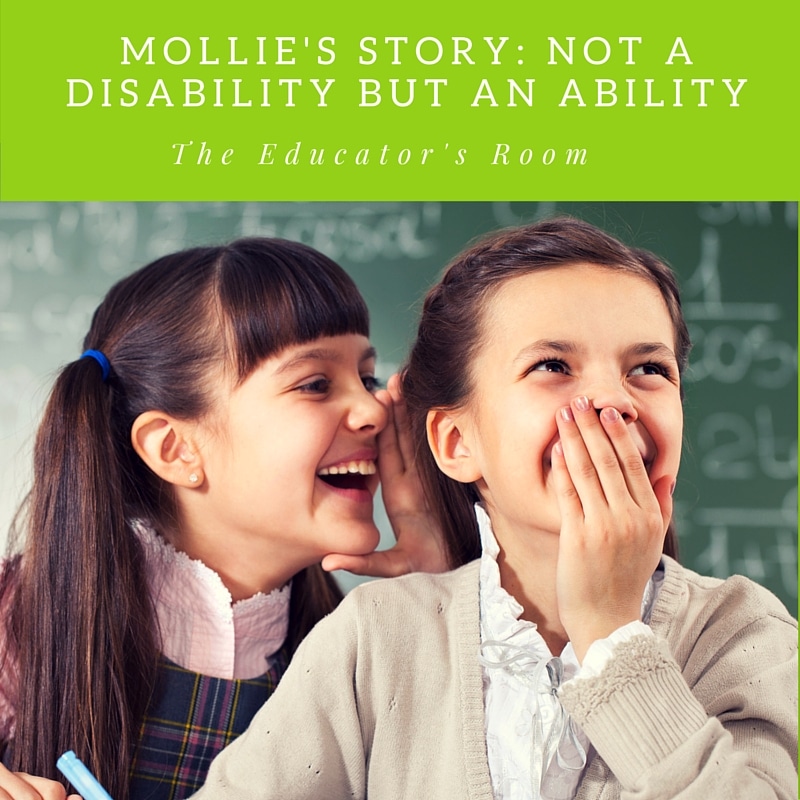Mollie’s Story
I met Anna, Mollie’s mom through politics. She and I began having small Facebook conversations about state-wide issues, despite her living in California and me living in Wisconsin. When she found out I was special education teacher, we bonded in yet another way. Her daughter was diagnosed with learning disabilities in reading so she understood the field from a parent perspective. After a while, I asked her to share Mollie’s full story and was stunned by the ending. Anna has given me permission to share Mollie’s story with you…the ending will stun you.
Mollie grew up going to a public elementary school in California. She loved kindergarten and all that is brought – friends, fun, creativeness, smiles, and learning. But her parents noticed something a little different in Mollie than in her friends. She was having difficulty in identifying simple shapes like triangles, squares, and circles. Mollie’s parents asked for her to be tested, and head off any sort of problem that might happen from putting it off too long. With a bit of a struggle, Mollie was finally able to be tested and was found to be under the 30th percentile among her peers, K-8. Services began immediately.
[fusion_builder_container hundred_percent=”yes” overflow=”visible”][fusion_builder_row][fusion_builder_column type=”1_1″ background_position=”left top” background_color=”” border_size=”” border_color=”” border_style=”solid” spacing=”yes” background_image=”” background_repeat=”no-repeat” padding=”” margin_top=”0px” margin_bottom=”0px” class=”” id=”” animation_type=”” animation_speed=”0.3″ animation_direction=”left” hide_on_mobile=”no” center_content=”no” min_height=”none”][bctt tweet=”Mollie was embarrassed to be pulled away from her peers to go to special learning classes.” username=”EducatorsRoom”]
At first, Mollie was embarrassed to be pulled away from her peers to go to special learning classes. She knew she was smart, but also knew she didn’t test well. Maybe she could learn how to take a test, and then everyone could see how smart she was? But it didn’t work. Her teachers kept teaching her reading, rather than test-taking strategies. She went to a commercial tutor after school each day to try to prove she was smart. She wanted to learn to read. She wanted to be like her friends. She practiced, she read, she memorized words, but still her reading and math scores continued to decrease. Mollies teachers insisted she be pulled out of their classrooms because her low test scores affected their overall test scores. Mollie didn’t want it, but Anna kept telling Mollie she was more than a test score. She was smart in all kinds of ways! A test did not define her!
As she prepared to enter high school, she learned she would have to take the CA High School Exit Exams in order to earn her diploma. It didn’t matter that she had an IEP that allowed her extra help on school work and tests. It didn’t matter that was completing all the work required by her teachers to pass the courses. She was to take this assessment, and if she didn’t pass it, she would not earn her diploma. Mollie was worried.
In her personal life, Mollie loved to sing and dance. She was already performing through her dance classes outside of school and excelled at it. Her parents found a community school that specialized in dance, theater, and the arts. They moved Mollie there, hoping she could express herself through her dance and find her smart. It worked more so than the public school. Mollies reading and math scores increased and she finally felt ready to attempt the CA High School Exit Exam. It took three attempt, and she passed on the third try! Mollie got her diploma!
Because of Mollie’s academic insecurities, she wanted to go to college, but was afraid. In CA, an IEP can follow a student to post-secondary schooling, so Mollie swallowed hard and went to City College. She had dreams and aspirations of going to the San Fransisco Design Institute. Maybe make some dance designs? But it was at City College where life took an unexpected turn for Mollie. She was required to take a psychology course, so she enrolled in abnormal psychology. She fell IN LOVE with psych! She couldn’t get enough. Within that same year, Mollie had a literature class, and was required to write.
This was one of Mollie’s weakest areas and it scared her to have to write at a college level. But her teacher, the first one to understand her needs, fears, and abilities, encouraged her to draw costumes for the various Shakespeare characters the had been reading about. Even though Mollie struggled in writing down her thoughts and ideas about Shakespeare, she was able to draw her way to a passing grade and honed her confidence. With the help of one teacher who got it, Mollie transformed from a student who was afraid and struggled to one who knew she could if she just had a little understanding and help. Mollie decided to enroll in a nearby university to earn a degree in psychology.
Being in a public school was not a total loss or horrible experience for Mollie at all. Sure, she struggled with her disability. She too often wondered if she could do it, if she was smart enough. She tried using glasses to see if it helped her read, she tried ADD medications thinking she as just not focused, she had an EGG done thinking there was seizure activity happening. But in the end, she learned how to cope and strategize herself. It was during that time she learned to use a planner to write down her schedule, and became disciplined in focus and attention to how she learns. She also learned tenacity; to never give up and stop believing in herself, even when her teachers did. She used these skills to move on to graduate school, and then to a doctorate.
From the little girl who couldn’t identify triangles, squares, or circles, to Dr. Mollie Peck, PhD in Psychology. Her dissertation studied the preconceived notions jurors have on violent males’ crimes on women versus violent female crime on men. Johns Hopkins has contacted Mollie for some post-doctoral work in the field and because she has been recognized as an exceptional clinician.
Mollie believed in herself because she had parents who believed in her and didn’t let her inability to test well stop her from becoming everything she was meant to be. And because of that one teacher, in college, who saw Mollie for who she was and encouraged her to be even more. Anna’s take-away message in sharing this story is that whatever label is put on a child, they are MORE THAN THAT. A child is not their label. It is not a measure of their ability, future, success or failure. It is simple a way for schools to define kids for scheduling purposes. It is not a true measure of any kind of success.
[bctt tweet=”A child is not their label.” username=”EducatorsRoom”]
 [/fusion_builder_column][/fusion_builder_row][/fusion_builder_container]
[/fusion_builder_column][/fusion_builder_row][/fusion_builder_container]




